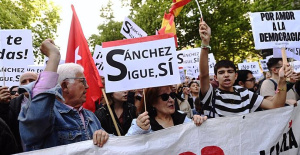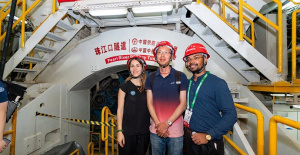MADRID, 29 Jun. (EUROPA PRESS) -
Pioneering Spanish research worldwide has managed to consolidate a new standard of treatment for early lung cancer, which means increasing survival by 20 percent and will benefit more than 6,000 patients in Spain every year.
The results of this study, carried out by the Spanish Lung Cancer Group (GECP) and published in the scientific journal 'New England Journal of Medicine', endorse the great benefit of chemo-immunotherapy with nivolumab before operating on lung tumors in stages III.
"This Spanish study has opened the door to a global change in the treatment of patients with early lung cancer. The United States made rapid approval for this treatment scheme to be available in North American hospitals, and we expect it to arrive this year in Europe as well. A global change that begins and consolidates with 100 percent Spanish research", celebrated the president of the GECP and principal investigator of the study, Mariano Provencio.
Currently only 30 percent of these patients survive five years. "With the new scheme, this percentage could reach 70 percent. More than 6,000 patients can benefit from improvements in response to treatment and survival each year in Spain," the doctor assured.
This new regimen is not just "one drug only." "We are talking about a change in the therapeutic approach and strategy that involves many professionals: pathologists, surgeons, oncologists or radiotherapists. We have found a significant improvement that can lead us to the cure of a significant number of patients after decades without progress", has detailed.
The data from the study, called 'NADIM II', open the door to increasing the percentage of patients who achieve a complete remission of their tumor in the long term.
In this sense, the research indicates that 36.8 percent of patients achieve a complete reduction of the tumor, compared to 6.9 percent who do so with the traditional approach of applying treatment after surgery.
The improvement in survival is also very clear, 20 percent higher, since with the experimental arm 85 percent of the patients are alive at two years compared to 63 percent with the traditional approach.
This treatment approach would also allow for an increase in the number of patients who may finally be operable: 93 percent of patients in the combination therapy group underwent surgery after treatment, compared to 69 percent in the combination therapy group. control.
"It is possible that more people will have surgery with this approach because this treatment is more effective in reducing the size of the tumor, without adding a lot of toxicity," explained Dr. Provencio.
At the time of diagnosis, more than a third of patients with lung cancer have early-stage or locally advanced disease. In this context, neither surgery nor radiotherapy alone is associated with good results.
"In these cases there are usually micro-metastases in a lymph node, so most patients eventually relapse, accounting for two thirds of systemic relapses," said Dr. Provencio.
In this sense, one of the strengths of the Spanish study is that it focuses on patients with locally advanced stage IIIA, with greater need for clinical improvements.
'NADIM', a pilot study in 46 patients, was the first worldwide study to analyze the benefits (feasibility, safety, efficacy, and survival) of administering chemoimmunotherapy with nivolumab before surgery and nivolumab monotherapy after surgery. patients with lung cancer in early or locally advanced stages. The results were published in 2020 in the scientific journal 'The Lancet', the most prestigious in the world.
"It was a change of approach that was gestated from an independent clinical research group in Spain. The results were so spectacular (81.9 percent of patients alive at three years, 69.6 percent had no progression of the disease after three years and 63 percent absence of tumor in surgery) that we captured international interest and a worldwide study was launched in this line that validated the NADIM data and was key to the accelerated approval by the FDA of this treatment", detailed Dr. Provencio.
Based on this pilot study, the GECP launched 'NADIM II', where there are two treatment branches that compare the chemotherapy standard for this type of patients against combined chemo-immunotherapy therapy and that validate the findings presented up to now and a paradigm shift. The 'NADIM II' study recruited 86 patients from twenty Spanish hospitals.

 Exploring Cardano: Inner Workings and Advantages of this Cryptocurrency
Exploring Cardano: Inner Workings and Advantages of this Cryptocurrency Seville.- Economy.- Innova.- STSA inaugurates its new painting and sealing hangar in San Pablo, for 18 million
Seville.- Economy.- Innova.- STSA inaugurates its new painting and sealing hangar in San Pablo, for 18 million Innova.- More than 300 volunteers join the Andalucía Compromiso Digital network in one month to facilitate access to ICT
Innova.- More than 300 volunteers join the Andalucía Compromiso Digital network in one month to facilitate access to ICT Innova.-AMP.- Ayesa acquires 51% of Sadiel, which will create new technological engineering products and expand markets
Innova.-AMP.- Ayesa acquires 51% of Sadiel, which will create new technological engineering products and expand markets Unicaja lifts its first FIBA Champions League at the expense of Lenovo Tenerife
Unicaja lifts its first FIBA Champions League at the expense of Lenovo Tenerife Abascal (Vox) criticizes that Sánchez is "victimizing" himself and calls for elections after his possible resignation
Abascal (Vox) criticizes that Sánchez is "victimizing" himself and calls for elections after his possible resignation Carlos Alcaraz reaches the round of 16 in Madrid without breaking a sweat
Carlos Alcaraz reaches the round of 16 in Madrid without breaking a sweat Some 5,000 people demonstrate in front of Congress for democracy, hours before Sánchez's decision
Some 5,000 people demonstrate in front of Congress for democracy, hours before Sánchez's decision How Blockchain in being used to shape the future
How Blockchain in being used to shape the future Not just BTC and ETH: Here Are Some More Interesting Coins Worth Focusing on
Not just BTC and ETH: Here Are Some More Interesting Coins Worth Focusing on UPV students build a prototype of a wooden house to move to Equatorial Guinea
UPV students build a prototype of a wooden house to move to Equatorial Guinea The UA opens the call for the Impulso 2024 Awards for the best innovative business initiatives
The UA opens the call for the Impulso 2024 Awards for the best innovative business initiatives ALI, virtual assistant from Alicante, internationally recognized by the OECD
ALI, virtual assistant from Alicante, internationally recognized by the OECD Retrópolis brings the golden age of video games and computing to the UPV
Retrópolis brings the golden age of video games and computing to the UPV A million people demonstrate in France against Macron's pension reform
A million people demonstrate in France against Macron's pension reform Russia launches several missiles against "critical infrastructure" in the city of Zaporizhia
Russia launches several missiles against "critical infrastructure" in the city of Zaporizhia A "procession" remembers the dead of the Calabria shipwreck as bodies continue to wash up on the shore
A "procession" remembers the dead of the Calabria shipwreck as bodies continue to wash up on the shore Prison sentences handed down for three prominent Hong Kong pro-democracy activists
Prison sentences handed down for three prominent Hong Kong pro-democracy activists ETH continues to leave trading platforms, Ethereum balance on exchanges lowest in 3 years
ETH continues to leave trading platforms, Ethereum balance on exchanges lowest in 3 years Investors invest $450 million in Consensys, Ethereum incubator now valued at $7 billion
Investors invest $450 million in Consensys, Ethereum incubator now valued at $7 billion Alchemy Integrates Ethereum L2 Product Starknet to Enhance Web3 Scalability at a Price 100x Lower Than L1 Fees
Alchemy Integrates Ethereum L2 Product Starknet to Enhance Web3 Scalability at a Price 100x Lower Than L1 Fees Mining Report: Bitcoin's Electricity Consumption Declines by 25% in Q1 2022
Mining Report: Bitcoin's Electricity Consumption Declines by 25% in Q1 2022 Oil-to-Bitcoin Mining Firm Crusoe Energy Systems Raised $505 Million
Oil-to-Bitcoin Mining Firm Crusoe Energy Systems Raised $505 Million Microbt reveals the latest Bitcoin mining rigs -- Machines produce up to 126 TH/s with custom 5nm chip design
Microbt reveals the latest Bitcoin mining rigs -- Machines produce up to 126 TH/s with custom 5nm chip design Bitcoin's Mining Difficulty Hits a Lifetime High, With More Than 90% of BTC Supply Issued
Bitcoin's Mining Difficulty Hits a Lifetime High, With More Than 90% of BTC Supply Issued The Biggest Movers are Near, EOS, and RUNE during Friday's Selloff
The Biggest Movers are Near, EOS, and RUNE during Friday's Selloff Global Markets Spooked by a Hawkish Fed and Covid, Stocks and Crypto Gain After Musk Buys Twitter
Global Markets Spooked by a Hawkish Fed and Covid, Stocks and Crypto Gain After Musk Buys Twitter Bitso to offset carbon emissions from the Trading Platform's ERC20, ETH, and BTC Transactions
Bitso to offset carbon emissions from the Trading Platform's ERC20, ETH, and BTC Transactions Draftkings Announces 2022 College Hoops NFT Selection for March Madness
Draftkings Announces 2022 College Hoops NFT Selection for March Madness























